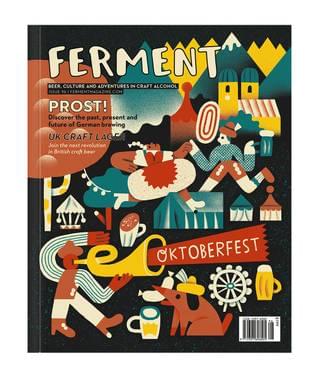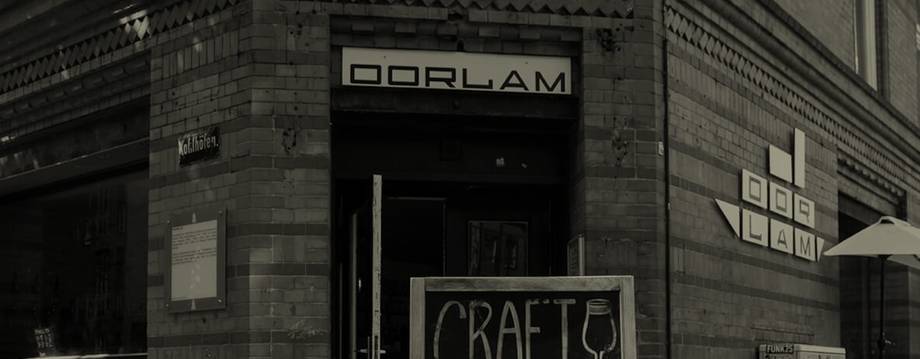The best thing in life is rarely IPA
Being born and bred in a tough market has prepared Buddelship for its biggest transition yet; a move from industrial Hamburg to the countryside
Robyn Gilmour
Photos:
Buddelship Brauerei
Saturday 23 September 2023

This article is from
Oktoberfest
issue 96
Share this article
As liberal a place as Berlin is, it is also a city guided by order, attitudes, and traditions. The nation’s capital might seem a strange place to begin a story about Buddelship – a brewery born in Hamburg but which moved 115 km west, to the middle-of-nowhere, in 2020 – but Berlin set the scene for an infamous moment in modern craft’s history, one that gave us a unique, unexpected insight into Germany’s beer culture, a topic very relevant to Buddelship’s story.
In 2019, craft giant Stone Brewing sold its Berlin production facility and adjoining taproom to Brewdog, a site it had invested millions in, spent years building, and projected to be Stone’s eternal stronghold in Europe. There’s no shortage of perspectives on why the projected demand just never materialised but in a statement made at the time of the site's closure – a mere three years after it had opened – Stone’s founder, Greg Koch, noted that “German beer prices are the cheapest in Western Europe. As most of us know from life, the best things are rarely the cheapest”.
My conversation with Buddelship’s sales manager, Ster Voorpijl, centres around the relationship between price and style, and how Buddelship – a brewery besotted with modern, quality, craft lager – has navigated this over the last ten years. On the one hand, the use of large quantities of expensive American hops pushes the cost of a beer beyond what people are willing to pay for it. On the other hand, the prevalence of lager in the German market, and in particular the macro brewing industry, sparked a race to the bottom that instituted the belief that lager, by nature, is cheap. This, of course, couldn’t be further from the truth.

While malt – the star of the show in most lagers– doesn’t cost as much as hops do, the real expense when brewing lager is the time it needs to spend in tank (you could brew two, if not three, batches of IPA in the time it takes to make one lager), the energy required to keep the beer cold while it ferments (which bottom-fermenting lager yeasts require) and, if you’re that way inclined, the expensive equipment that’s required to perform a proper decoction (mashing at various temperatures, to provide yeast with the greatest variety of digestible sugars, and allow the malt to showcase it’s full range of flavours).
Once your costs are covered, the real challenge of brewing lager lies in properly managing the yeast that ferments it. With the behaviour of this living, dynamic, and sometimes volatile organism changing on a day by day basis, lager is easy to fuck up, and unforgiving of mistakes. It’s ironic, really, that macro breweries should have co-opted this style, when it might just be the beer that shouts the loudest about corners that were cut during the brewing process, a characteristic I dare say contributes to many craft breweries' reluctance to produce them without an expert on the team guiding operations.
Now consider the time, skill, and costs associated with making a proper lager, then add to that the expense of dry hopping, or using imported hops, as Buddelship often does, to bring an element of modern craft to a product that’s entrenched in tradition in Germany. The result is a beer that consumers aren’t familiar with and might be resistant to paying for. As brilliant a product as Buddelship is making, finding a market for it can sometimes feel like an uphill battle.

“For example”, Ster begins, “I was helping out at a friend’s bar last weekend — it’s not a craft bar, but it’s got 10 taps, so has some variety — and a customer asked me for a recommendation. I pointed to our IPL but he was like ‘€6? I’m not paying that’. If it had been an IPA, he wouldn’t have been surprised at that price, but because the word ‘lager’ features, people think it should be cheap. I tried to explain that it didn't taste like a pils, that it was dry hopped, just bottom fermented, but no. If we’re talking about lagers, it doesn't matter that it’s better than anything else on tap, that I love it, all the bar staff love it, anyone who samples it loves it. The house lager is €4.50.”
On one hand Ster is dismayed by this, but on the other, takes solace in the support of the international community. Like many celebrated craft breweries in big-beer countries, Buddelship is known and respected outside of Germany, often holding a stand at Mikeller’s annual MBCC festival, with as big a line behind the bar as in front of it. But winning the coveted yet unofficial brewers’ choice doesn’t make Ster’s job any easier, only more frustrating.
The brewery’s saving grace is that founder Simon Siemsglüss’s love of lager is an axiom, a fact of nature so unshakable as to be undeterred by something as fickle and transient as a market. Attitudes change, Simon’s love of lager does not. Prior to founding Buddelship in 2013, Simon studied to become a master brewer in Berlin, worked in the UK during its early craft beer years, and from there travelled a bunch before returning to Hamburg to set up a brewery of his own in the port’s industrial outskirts.
Here Simon and his partner Nienke built a small brewery in an old fish canning factory, and Buddelship steadily garnered recognition as a brewery specialising in lager, sour and wild fermented beers. That Simon would focus on these styles, was never in question, not even in the face of a challenging market. The real soul searching, for Simon, and for Buddelship, lay in his decision to quit Hamburg, in 2020, and move operations to the deepest, darkest countryside.

Buddelship taproom
As devastating as it is to be evicted by property developers, eager to turn the site of your independent business into a more profitable venture, I’m reluctant to think of the brewery as a victim. I don’t think it views itself this way. Buddelship’s taproom, Bar Oorlam, remains in Hamburg, while Simon, Nienke, and their two children now live on Lost Horizon Farm, an expansive area of land in north Germany, named after Buddelship’s barrel-aged range, a project which has only been expanding since the move.
Buddelship is currently crowdfunding for the construction of a new brewery there, and is contracting to keep beers flowing in the meantime. On the farm, the family has also built a distillery, where Nienke makes spirits using home grown ingredients. But what’s perhaps most interesting about Lost Horizon farm, is that it’s now trialling the growth of cereals and hops; a first tentative step towards self-sufficiency.
This might be a long time coming, or progress as rapidly as our planet is warming, but irrespective of how long the journey lasts, the decision to make self-sufficiency a destination seems symbolic. Though the politics of beer in Germany prevails, so too does the persistence of Buddelship, a modern, German craft brewery, determined to marry tradition and innovation, national with global, country with city.
Share this article

